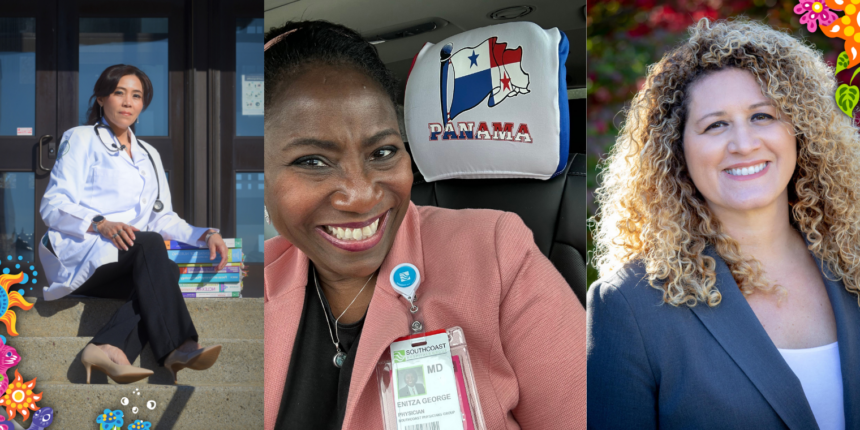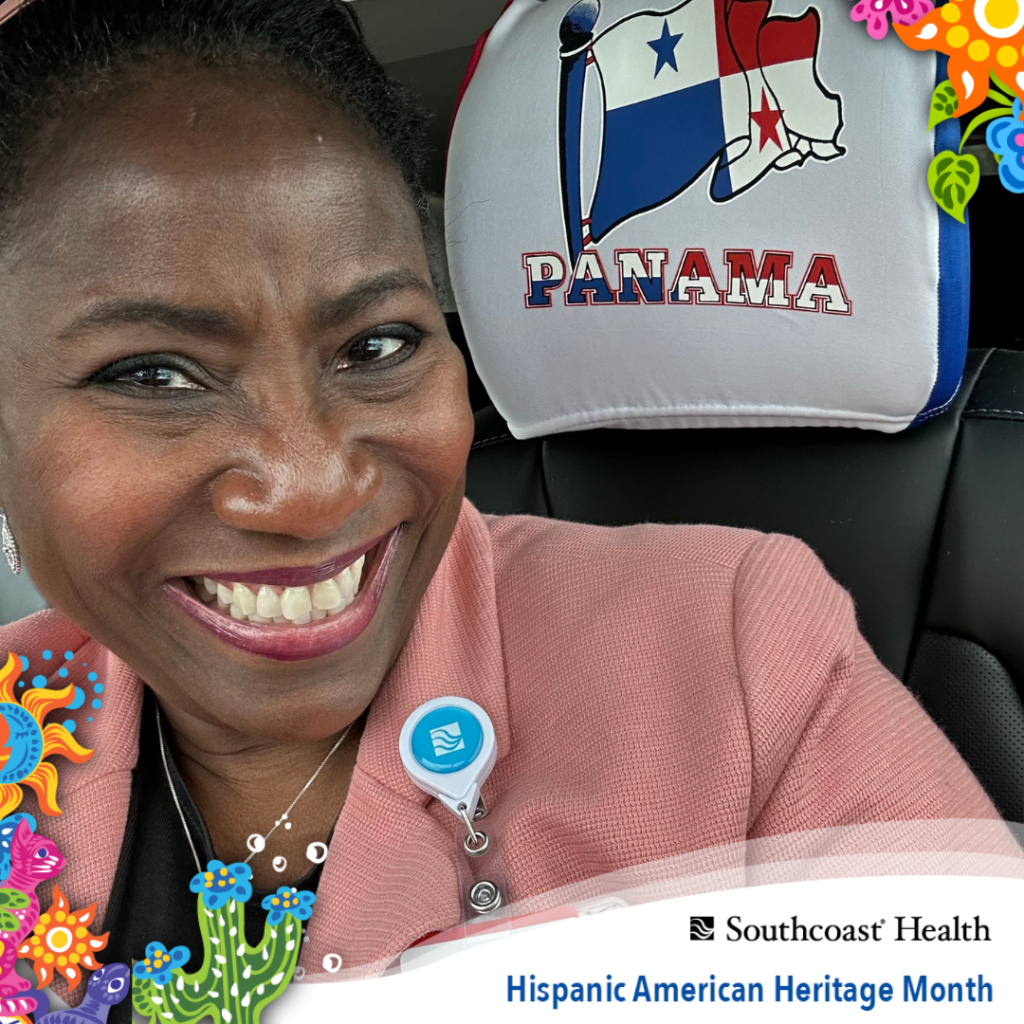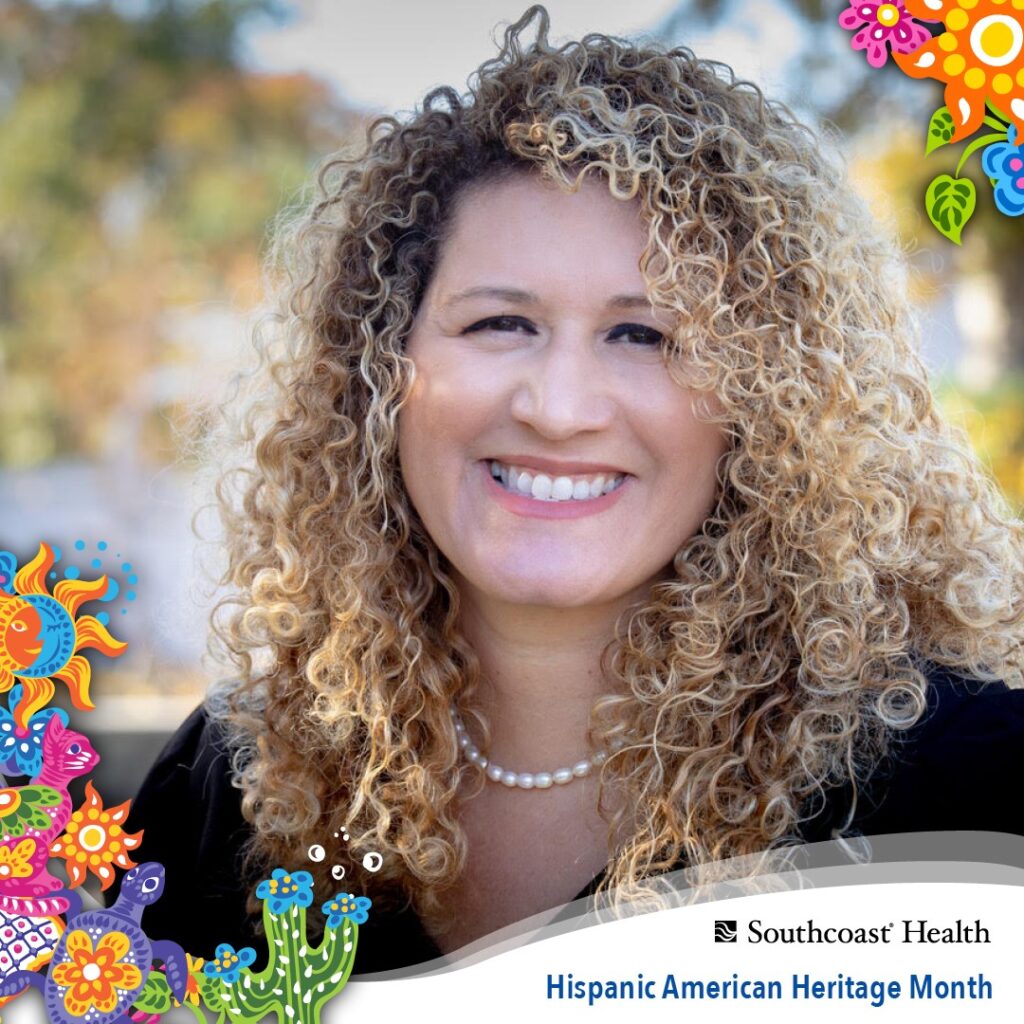News Releases
Celebrating Hispanic American Heritage Month

This year, we are pleased to introduce you to three remarkable individuals who embody the spirit of HAHM and have made significant contributions to our community and healthcare system: Sandra, Dr. George, and Melanie.
Hispanic American Heritage Month (HAHM) is a time to honor and celebrate the rich cultural contributions of Hispanic and Latino communities to American society. This annual observance, which takes place from September 15th to October 15th, reminds us of the diverse talents, traditions, and stories that shape our nation. HAHM emphasizes the crucial roles played by Hispanic Americans in various fields, including healthcare.

Sandra Caceres, RN
I am a registered nurse on Charlton Memorial’s Atwood 3 Med Surge floor. I was a CNA for 4 years before becoming a nurse when I graduated in 2021.
There are over 1 million Hispanic or Latino residents living in MA & RI. What would you like to share about your family’s background and your story? A favorite memory related to your Hispanic culture, heritage, or language?
I was born in Honduras, and I immigrated to this country when I was 19. I was alone with no family or friends and no idea how to speak English, but I slowly learned how to adapt and learned the language. I worked on obtaining my General Education Degree (GED) while taking care of my three daughters. I worked my way to becoming a CNA and now a RN.
Growing up, I always knew that I wanted to help people as a nurse, but unfortunately, I came from a poor, third-world country and going to college was never an option for me. Having my dreams realized and being able to help everyone, especially my own Hispanic community as a nurse is the most rewarding feeling. The way my patients’ faces light up when I can speak to them in their native language (Spanish) has been my favorite memory of all time. It is such a big advantage to being a bilingual nurse because I can closely understand the needs of those in my own community.
Please share a little about your role in caring for the entire community, including our Hispanic community.
I am able to make a connection with my patients and let them know that I am there for them as more than a nurse, but someone who truly understands them. Having Hispanic representation in the hospitals is very important because it provides sincere care to patients who may not speak English or who feel more comfortable knowing they have someone from their background.

Enitza Damaris George, MD, MBA, MS
I am a Family Physician & Deputy Chief Medical Officer of the Southcoast Health Network. I started here on June 19th, 2023.
There are over 1 million Hispanic or Latino residents living in MA & RI. What would you like to share about your family’s background and your story?
I am Panamanian. My ancestry is Panamanian-Jamaican-Ethiopian. My connection to the USA is bridged by the Panama Canal, where my grandparents and my parents worked. Thanks to the Panama Canal, I was raised to become a Global Citizen, with a unique world view that allows me to connect with peoples of all walks of life.
A favorite memory related to your Hispanic culture, heritage, or language?
I was born and raised in Panama, and I studied medicine at the University of Panama. I later did my specialty in Family Practice at SUNY-Brooklyn in New York, where I served their large Latino community. And prior to relocating to Massachusetts, I spent the past three years in Wisconsin. But still, whenever I am asked where I am from, I proudly answer “I come from Panama.” It is of immense pride for me that my Massachusetts Medical License reads “A graduate of Universidad de Panama in the year 1991 has been duly registered by this board as qualified physician, as provided by the laws of the Commonwealth.” Viva Panama!
Please share a little about your role in caring for the entire community, including our Hispanic community.
Whenever I have the opportunity of caring for a Spanish speaking person, I make a point of conducting the visit in Spanish because I know that there is a deeper level of trust that is created when patients are given the opportunity to express themselves in their native language. I’ve noticed that when patients realize I am Panamanian, and that I can speak their language, and understand the culture deeply, their faces light up as if saying “This doctor really gets me!” The excitement is mutual.
What else would you like to share?
I would encourage all Latino/Hispanic people in our community to speak Spanish at home and ensure the language is passed down from generation to generation. It is important for the preservation of our culture, but also because just knowing a second language will open a world of possibilities. I like to say that English will open the door to career success, but once in the door, Spanish will afford you access to many more spaces where English is not spoken.

Melanie Cluley, MBA, SHRM –IWC
I am the Director of Organizational Culture and Engagement, Diversity, Equity, and Inclusion Chair for Southcoast Health.
There are over 1 million Hispanic or Latino residents living in MA & RI. What would you like to share about your family’s background and your story?
I come from a large family. My mother has 10 brothers and sisters, resulting in me having 63 first cousins. I am the oldest female cousin.
I lived in a predominantly Puerto Rican neighborhood in Brooklyn NY until age seven, and my grandmother, aunts and uncles lived in the apartment upstairs. I grew up speaking both English and Spanish at the same time.
My mother came to the US when she was 14, and father was seven. My mother’s story is very similar to author Esmeralda Santiago’s story in “When I was Puerto Rican,” and I always encourage that people read it.
My father was in the US Marine Corp, and we were stationed in at the former Naval Station Roosevelt Roads in Ceiba, Puerto Rico. This meant that although I lived in Puerto Rico, I only attended English speaking schools with students whose parents were active duty from all over the world.
I am proud of the fact that Puerto Rican culture remains strong in my family. It’s important to me that our customs and traditions remain alive, and I enjoy sharing information about our culture. When my kids were little, I would volunteer to read a “Doll for Navidades” to their preschool and elementary school classes. I would bring mango ice cream and arroz con dulce (coconut rice pudding) for the kids. It’s a great book for kids to learn about our traditions.
A favorite memory related to your Hispanic culture, heritage, or language?
Most of my favorite cultural memories involve holiday gatherings with my family and friends. Puerto Ricans typically celebrate “Nochebuena.” Nochebuena is a Christmas Eve celebration – a time for family and friends to gather and eat, drink, be merry. We typically serve Arroz con Gandules (Puerto Rican rice and pigeon peas), roasted pernil (Puerto Rican roast rork) and pasteles (green plantains, with pork encased in banana leaves). All this is accompanied by an ice cold glass of Coquito (very similar to eggnog, but made with Coconut milk and rum). You can view more traditional recipes here. I have continued this tradition in my home and my children now look forward to celebrating Nochebuena.
What else would you like to share?
I would encourage all Latino/Hispanic people in our community to speak Spanish at home and ensure the language is passed down from generation to generation. It is important for the preservation of our culture, but also because just knowing a second language will open a world of possibilities. I like to say that English will open the door to career success, but once in the door, Spanish will afford you access to many more spaces where English is not spoken.
Learn More about Diversity, Equity and Inclusion at Southcoast Health by visiting Diversity, Equity & Inclusion at Southcoast Health | Southcoast Health.
